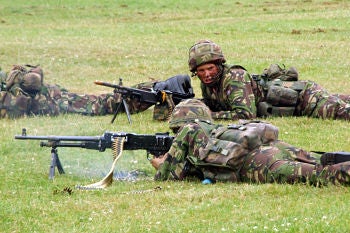
La página que intenta visitar sólo está disponible en inglés. ¡Disculpa!
The page you are about to visit is currently only available in English. Sorry!


A new boot camp concept is cropping up—it trades rope climbing and tire hopping for planting and irrigating. In other words, instead of preparing soldiers for war, it aims to help them transition to peace, as farmers.
The “veteran-centric” farming movement, as reporter Patricia Leigh Brown refers to it in , offers veterans and soldiers a chance to return to civilian life, and with a purpose. “It gives them a mission statement—a responsibility to the consumer eating their food,” said Colin Archipley in the article. Archipley is a decorated Marine Corps Infantry sergeant who completed three tours in Iraq. He also owns organic farm , which offers a six-week program—dreamed up by Archipley and his wife—intended for both veterans and active-duty military personnel. The syllabus was approved by a transition assistance program at nearby Camp Pendleton (not too far from San Diego) and includes hands-on farming activities as well as lessons in business, according to the .
Sunny so-Cal isn't the only place where soldiers can exchange a gun for a hoe, either. The , founded by organic farmer Michael O’Gorman after his son joined the Coast Guard, introduces veterans “to the range of opportunities in our industry, or helps support and advance them if they have already chosen our field,” states the non-profit’s . Among its ammenities, the site offers online resources and a list of existing “farming veterans.”
Laboring over crops demands strength, stamina, and a drive to succeed, no doubt. Considering the likelihood that half of all farmers will retire in the next decade, who more equipped to pick up the slack than military men and women?—especially those returning to the rural communities they left, which represent 45 percent of the military.
Though some of the requirements might be the same to work on a farm as in a battlefield, however, there are notable contrasts. “One thing I’ve noticed about agriculture,” Mike Nelson Hanes, once a machine gunner, told the NYTimes, “you become a creator rather than a destroyer.”